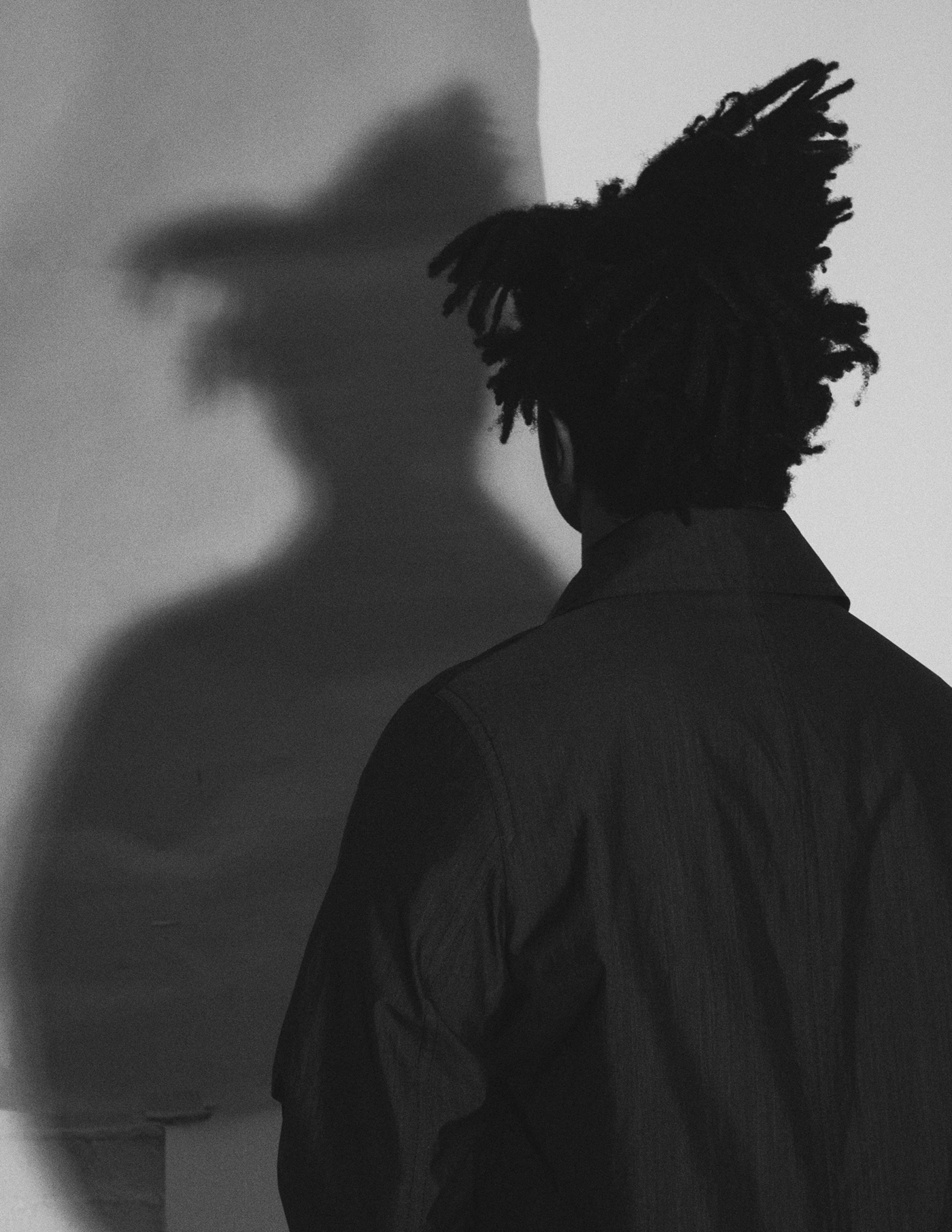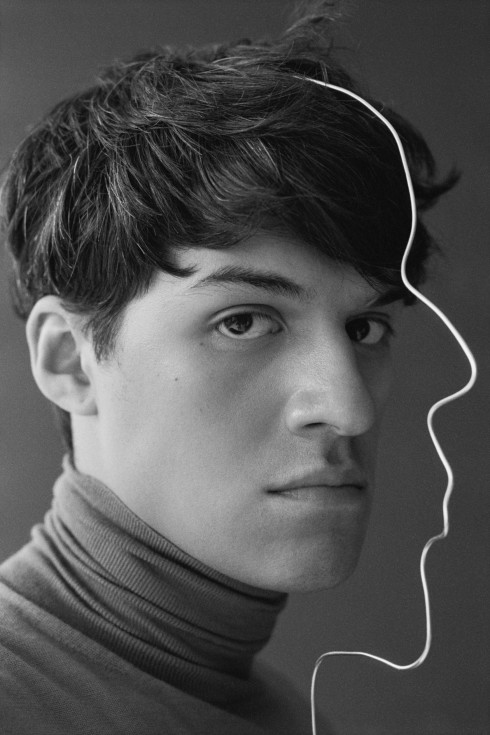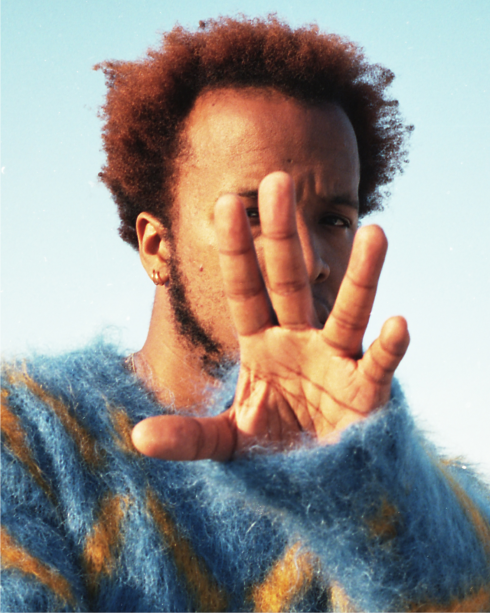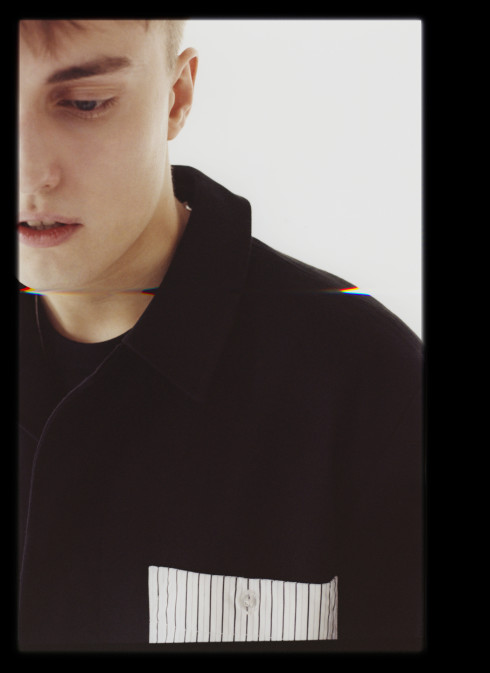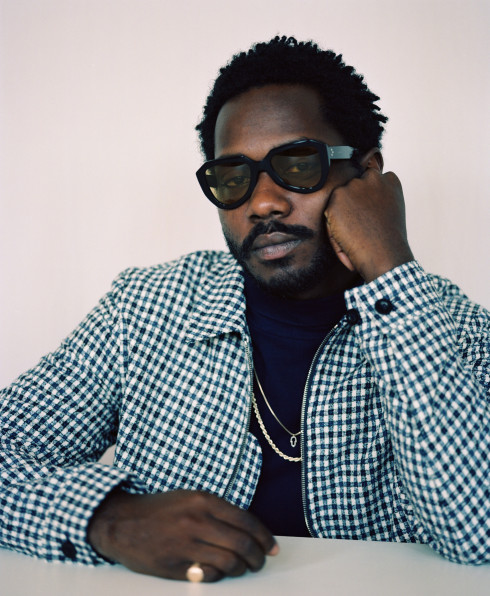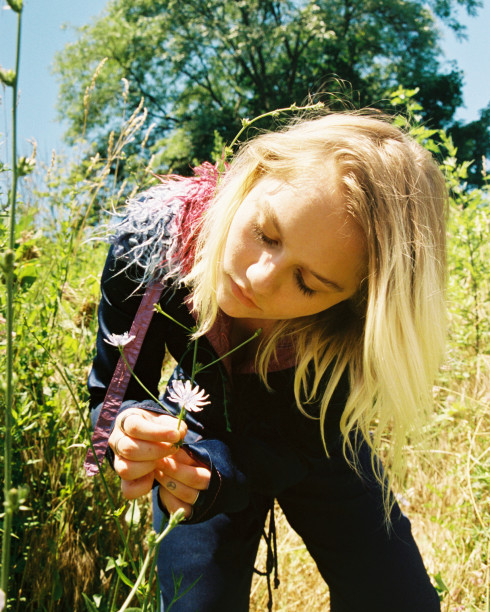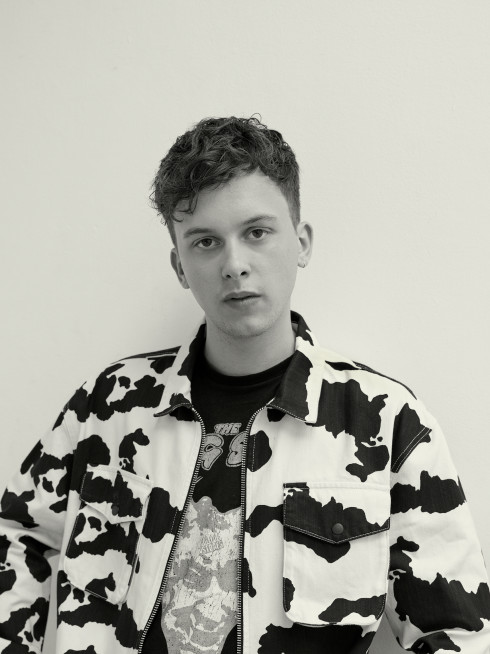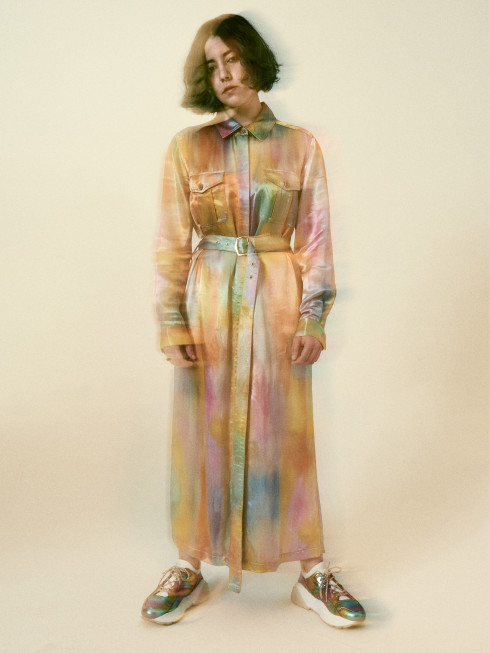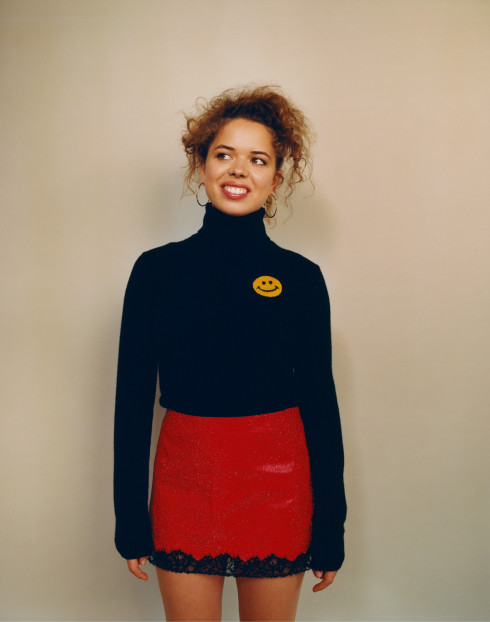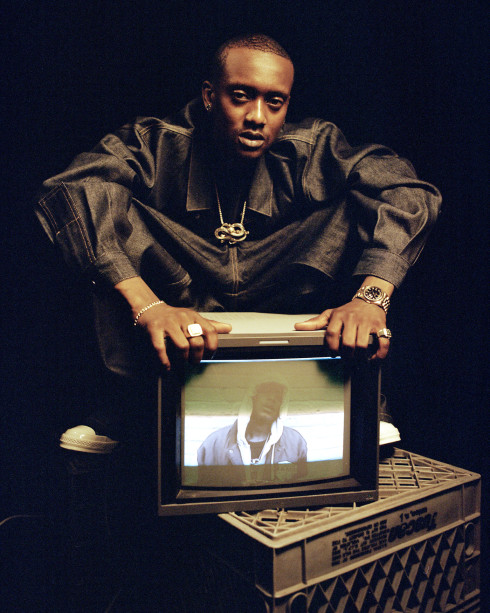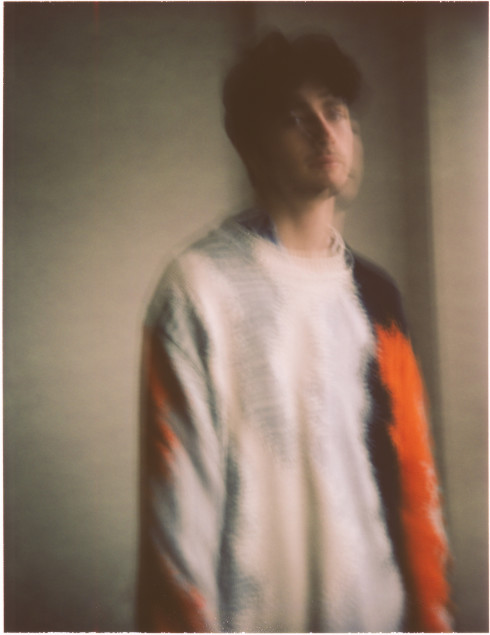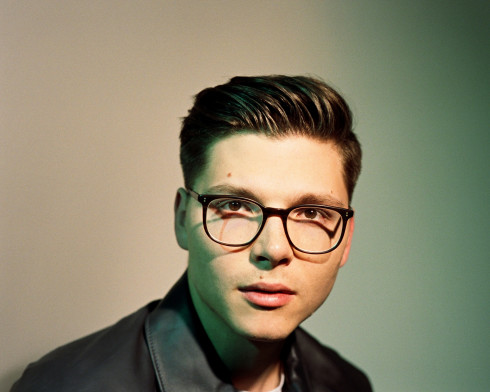
Jacket by Salvatore Ferragamo. T-shirt by Sunspel.
- By
- Yelena Perlin
- Photography by
- Alex Franco
Styling by Jeanie Annan-Lewin. Grooming by Michael Harding at Lalaland Artists.
SAMPHA
“The words will kind of come out of my mouth—I don’t write them,” says Sampha, battling a little jet lag on the eve of his début solo performance on The Tonight Show in New York this past January. “They naturally come out.” The ardent vocalist performed his latest single “(No One Knows Me) Like the Piano” off his first album Process, out Friday. He speaks in cascading tones, with a reserved shyness to his demeanor, yet he has a peaceful certainty to his words as he details his “process.”
Sampha Sisay, twenty-eight, was born in Morden, a suburb eight miles southwest of London. His parents and three oldest brothers had moved into the semi-attached house where Sampha was raised from their hometown of Kenema, Sierra Leone, in 1982 after his father, a diamond evaluator, got a new job. The youngest of five sons, Sampha’s formative years were shaped by his mother and brothers after his father passed away from lung cancer when Sampha was nine years old.
Before he died, Sampha’s father purchased a piano from a neighbor to serve as a productive distraction and in turn provided Sampha the first steps to his musical career when he was three years old. This is the piano that Sampha sings about in “Like the Piano,” written in the final year of his mother’s life, who also died of cancer in 2014.
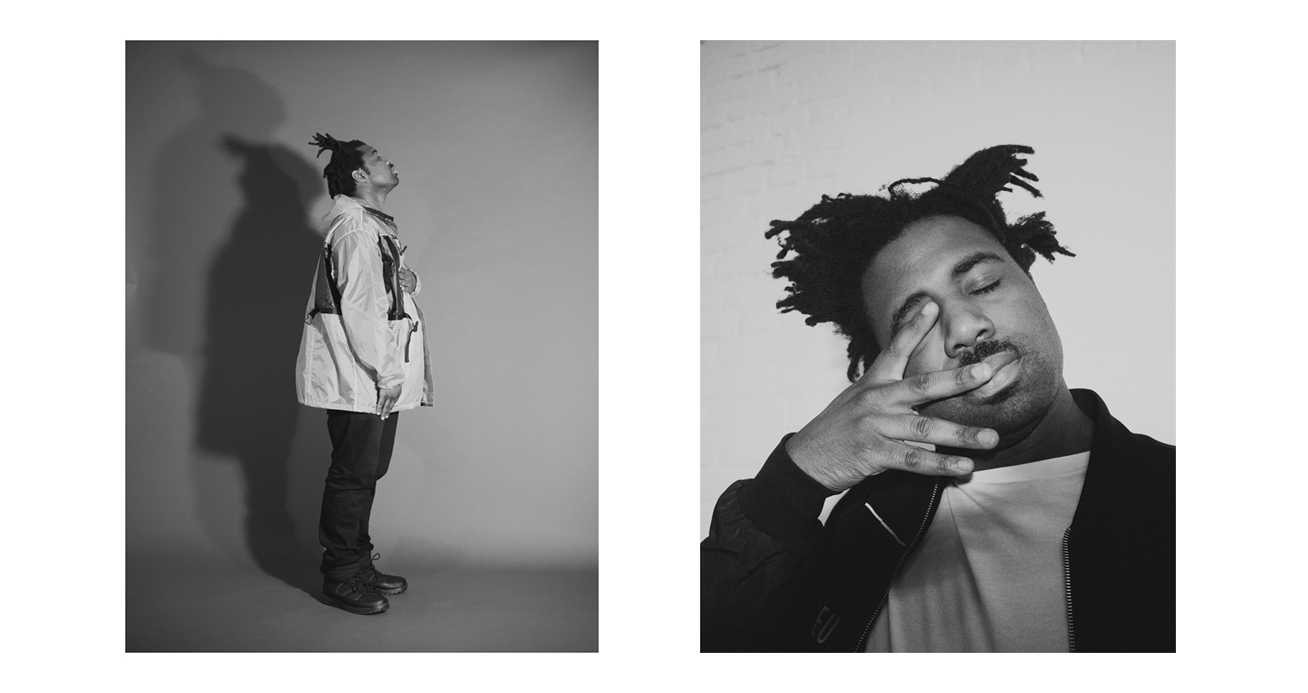
Sampha started his career as a musician like many great musicians of the late Aughts—on MySpace. Working on beats in the makeshift studio his brother Sanie made in their home, he found a community online that allowed him to express himself. It was on MySpace that he met London producer Kwes, who introduced him to the label Young Turks, which released his début EP Sundanza in 2010. He released his EP Dual in 2013, which featured “Indecision,” a song reflecting on the feelings of uncertainty and the crippling, restraining nature of imposter syndrome. “I never thought I was technically good,” says Sampha. “That’s why I always got nervous about singing live. People just concentrating on my voice; I could hear all the imperfections quite loudly.” And yet Sampha’s career took massive strides up to the release of Process, most notably recording and touring with SBTRKT, as well as working with Drake, FKA twigs, Frank Ocean, Solange, and Kanye West, who in turn helped pen “Timmy’s Prayer,” the début single off Process.
More comfortable making beats and freestyling lyrics, it took Sampha a while to accept himself as a vocalist, even as critics and his audience didn’t hesitate to jump on the bandwagon after he was a featured vocalist on a SBTRKT track in 2010, suddenly asking, “Where is the album?” and “What is the plan?” But releasing music using his own name gave Sampha no space to separate himself from his moniker, and he quickly saw how differently vocalists were perceived and treated from other types of musicians. The music industry felt arcane to him, and he feared he wasn’t emotionally capable of dealing with its rhetoric and pace. He did everything he could to not lose himself. “I didn’t really know emotionally how to let go of some things,” says Sampha. “People commenting on things.”
It took time for him to become comfortable being “Sampha, the singer,” and in 2014 when he moved back to Morden to take care of his ailing mother he began forming the body of work that would become his full-length début. But all in all, it wasn’t that calculated. “I had to get used to the fact that I was singing more. So it’s more so just me feeling emotionally stable to release an album,” says Sampha reflectively. “I would have been swept away. Just because of the way I am, I wear my heart on my sleeve a lot.”
With Process, Sampha says he aims to “paint a picture of a person with a lot going on.” Divided into three movements, the album is a rollercoaster. Building a heavy mood, it opens with “Plastic 100°C,” which details his struggles with a stress-triggered medical condition that causes a lump to appear in his throat, which first occurred while he was on tour with SBTRKT in 2011. Neil Armstrong’s staticky voice echoes, “I’ll work my way over into the sunlight here without looking directly into the sun,” introducing the album over a building atmospheric, string-carried beat. As the bass and volume both rise, Sampha begins to sing, asking, “Houston, can you hear me now?” quickly to express his worries about death. “It’s a metaphor for just being,” he explains, “wondering about the other side.”
Continuing on the ride of the album, “Like the Piano” is a dive into solace. It’s a reflective moment that personifies Sampha’s piano but also parallels the relationship he had with his mother. This acknowledgement of the love and care he felt, parallelled with the disconnect children often feel from their immigrant parents stemming from a gap in understanding, is a notion he circles back to in the album’s closing track “What Shouldn’t I Be?” For the musician, it’s about creating a narrative with himself—how he can find the balance in “being self-indulgent both in life and career” while realizing and acknowledging “that it’s not all about you.”
Sampha’s own self-criticisms chase after and bark at him in the album’s howling and hypnotic second single “Blood On Me.” Visually influenced by the futuristic anime Ghost in the Shell and further expanded by the cinematic music video featuring racing hounds, Sampha says that the song is about “that feeling of being guilty, of doing something wrong.” Explaining the song’s perspective, he croons Nina Simone, reciting, “Oh, Sinnerman, where you gonna run to?” He speaks of his anxieties from the perspective of someone who witnesses his own repressed emotions; there is the difficult knowledge that you cannot run away from yourself: “They said there’s something bleeding in me/Something screaming in me.”
Sampha writes most of his lyrics freestyling over beats or while playing the piano. “[It’s] like a spiritual thing in terms of me connecting to the zone,” he says. The aim is “letting go and being comfortable with not knowing.” “The music feels spiritual to me because a lot of it is coming from me being aware of the fact that I’m not in control,” says Sampha. What often draws listeners into his music is the comfort they are able to find in the raw honesty of his lyrics—which Sampha works consciously to create. “There is a lot of my music that is sharing some vulnerabilities, and if anything, I hope it just makes people feel something,” he says. “You can sometimes just go along life every day without really connecting to emotions, and I feel like that’s an important part of life. For me personally, it reminds me that I’m alive, that I’m a living, breathing thing.”
Naturally self-deprecating, Sampha often jokes when he speaks, with himself or his music as the punchline. And while for some, doubting oneself can serve as a hindrance, for Sampha it was part of learning to accept himself. “It’s actually just knowing it’s a balance, because that is sometimes what makes you who you are,” he explains.
In February, Sampha returns to the States for the American leg of the Process tour. His first solo run of shows in October just barely behind him, including two sold-out New York dates, Sampha has worked hard to retain the emotional currency of the album for the live show, creating an experience that feels alive. “I actually have to find those feelings to try to connect to the words,” says Sampha. “I want to connect to what I’m saying. I want that to come across.”
A large part of Sampha’s music comes from conversations he is having with himself, finding the words to express himself. He describes the emotion he most often gravitates towards as “relative harmonic complexity,” something even he struggles to define, which is something his fans can attempt to do as they finally learn more about him through Process.
Process is out tomorrow.
- By
- Yelena Perlin
- Photography by
- Alex Franco
Styling by Jeanie Annan-Lewin. Grooming by Michael Harding at Lalaland Artists.
